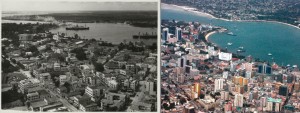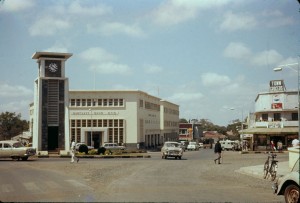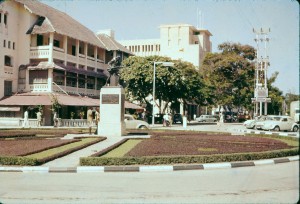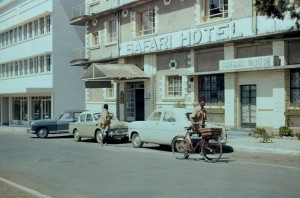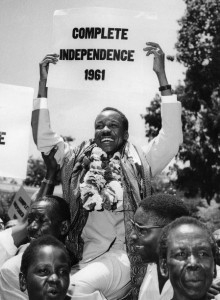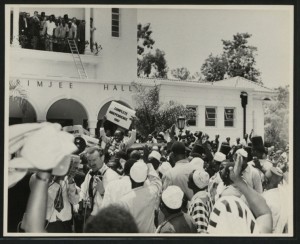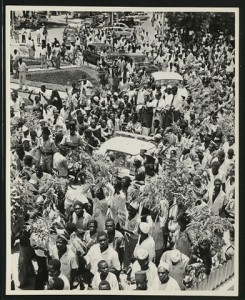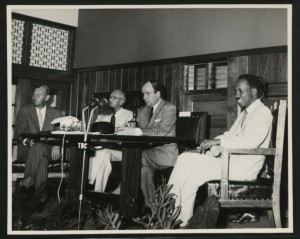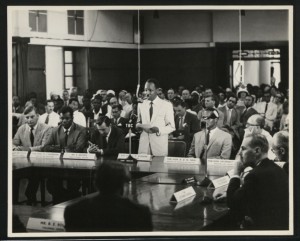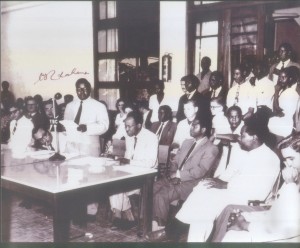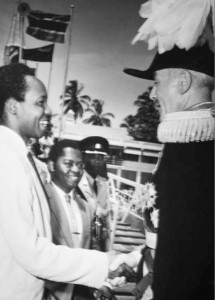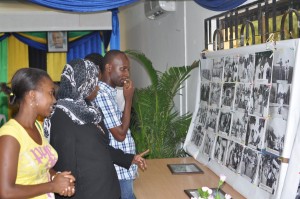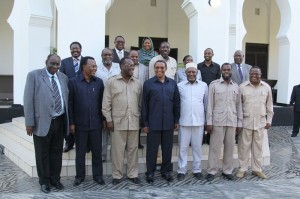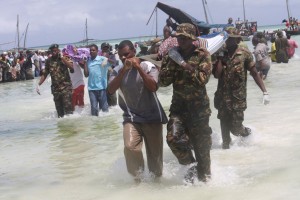THE NYERERE STYLE
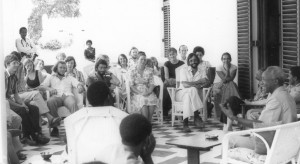
President Nyerere meeting with VSO volunteers in 1977 - see article on VSO in Tanzania later in this issue
President Nyerere gave hundreds of interviews before, during and after his terms of office. We are grateful to Peg Snyder/Paul Bjerk/Juhani Lomppololle/ Aili Tripp for digging out and transcribing an interview given by Mwalimu in 1971 to a Finnish journalist. Extracts:
Nyerere: … In 1961, what was our major ambition? Our major ambition was obviously to survive as a nation. We have survived as a nation, we have consolidated ourselves as a nation, and we have consolidated our independence. I suppose really, quite frankly, this is our biggest achievement. Only as an independent country could we do such things as raising standards of living, increasing education, and so forth. Well I can’t say we have achieved all we would have liked to achieve.
Questioner: You place a very heavy emphasis on rural development… but in this report, you say, “indeed more money has in fact been spent on urban developments, industrial and business development, than on rural areas, in this post-Arusha period”. So what could, in your opinion be the reason for that?
N: One is habit. The other is the ease. It’s easier to invest in urban areas than to invest in rural areas. Simply habit. Habitually this is what happens, you establish a habit where investment flows into the urban areas because it flows there habitually. And apart from habit you have certain facilities which have been put in urban areas, and if you are going to use these facilities properly, really you are forced to put something in … And I say secondly, it’s easier to plan a textile factory than to plan a village. A village of three thousand workers, three thousand peasants requires a great deal more, more innovation if you like. We are less used to this. Basically I think, habit. We have to break the habit of thinking in terms of employment. Because even if, now, if we want to build a school, if we want to build a secondary school, …the majority of the students who go into this secondary school are from the peasant areas, peasant sons and daughters. But we will have by habit put the school in an urban area…
Q: What are your reservations about foreign development corporations?
N: I think reservations would be quite normal. Quite normal. It is always a matter of judgment what country we are dealing with. Very often rich countries use their ability to assist poorer countries in order to dominate these poorer countries, to build spheres of influence, to keep other competitors, other nations out. And they regard them as competitors. A kind of jealousy develops. I want to build a railway, and I try to get some money from the Western world; if I don’t get that money then I try to get it from China. The fellows do not want to give the money, and then they ask why? why? This is introducing the Chinese to Tanzania. There is kind of feeling… keep the Chinese out, Tanzania is our sphere of influence. You know the Chinese should be kept out. It becomes a kind of instrument. Aid becomes an instrument of imperialism. And this is really the first reservation. Secondly, aid should help us to do what we want to do. It’s no use some country coming here with some brilliant idea that they want to do xyz. And in our own priorities we don’t want to do xyz, it is something that can wait until the 2000s.
Q: Do you see anything remarkable in the Chinese assistance causing any changes in the non-alignment policy?
N: I don’t see why it should. Non-alignment has never meant that a non-aligned country should have nothing to do with an aligned country. This has never been a definition of non-alignment. It has the meaning that we must never behave in our relations with aligned powers as if we belonged to their blocs. We don’t. And we have relations with China just as we have relations with the Soviet Union or relations with the United States. We see no reason why it should affect our nonalignment. Actually we feel it is an expression of our non-alignment. We would find it ridiculous that it is not alright for us as a non-aligned country to ask the Soviet Union or the United States to build a railway for us. But somehow it becomes wrong for our non-alignment if we ask China to build a railway for us (laughter).
Q: Your views of the present dispute between Tanzania and Uganda amidst reports of border clashes. Do you think there will be a danger of war?
N: Well, what you really want one never knows. I mean it takes two, to bring about war. But actually it doesn’t take two, it can take only one. So in that sense, if one side decides to be foolish, this foolishness can lead to a dangerous situation. But frankly, I don’t believe that these troubles on the border can cause, can be developed into anything more than troubles on the border.
Q: What is your comment on the British Foreign Secretary Sir Douglas Home going to Salisbury trying to negotiate a settlement to the Rhodesia problem.
N: Our views have been very clear for years and they’ve not changed. It was Sir Alec, when he was Prime Minister of Britain, who formulated the so-called five principles. And it was while he was Prime Minister that we said we don’t accept these principles as a basis of granting independence to Rhodesia, because they mean granting independence to a country on the basis of minority rule. And we don’t accept this. And it is really this which he’s going to negotiate with the Rhodesians. He’s going to negotiate with the White Minority there. To hand over to them the government, the same thing that they did in South Africa. They want to create a second South Africa. This is really the whole basis of these talks, to create a second South Africa, and we’ve always said we can’t accept this. What are we expected to say? ‘This is fine’?
Q: Is there any settlement which you would not consider to be a sellout?
N: Any settlement. Any settlement on that basis would be a sell-out. Handing over five million people to the good will of a tiny minority, and believing that this minority at some future date will hand over power to the majority. It doesn’t happen.
Q: You said in September this year in this report, Tanzania has paid a heavy price in economic aid for her stand on these matters. But neither in relation to Britain nor any other country have we wavered on the policies we believe to be right because of our desire to develop our country at maximum speed. Have you ever doubted?
N: Have I ever doubted our policy? Never.
Q: But you have paid a price?
N: Well surely you must pay a price for your freedom, if it is really freedom. If we wanted to remain a colony we could have remained a colony. As a colony our responsibilities wouldn’t hold. I got my grey hair in our second year of independence. My hair was black, completely black when we became independent, and in two years it had gone grey, because of some of the problems of independence. If you don’t want the problems of independence don’t become independent.
Q: Do you think that the freedom fighters will succeed?
N: Why not? If we didn’t believe they will succeed then there is no point in fighting is there? There’s no point in the struggle is there? Unless it is a kind of religion. There’s no point in struggling for freedom unless you believe you are going to win. And if we believed these people are wasting their time, why should we be working to get support for them throughout the world. We are trying to get the world to understand this problem in southern Africa, and to understand that these people are struggling for human rights, and they must be helped until they win. If we didn’t believe they have a chance of winning there is no use helping them, or trying to get their world to help them.
Q: Now this is the last final question. Mr. Karalov has suggested that you have been translating William Shakespeare into Swahili. Have you yourself been writing any poems?
N: No. Not poems in that sense, not poems in that sense of William Shakespeare. Everybody. Every literate person has written some verse. So that’s all. This question of Shakespeare is really you have read Shakespeare, so have I. Some. I have not read Shakespeare, I have read one or two books, not more than one or two books. And then sometimes I, because of my interest, not so much because of my interest in Shakespeare, but in Swahili. I have translated some bits of Shakespeare into Swahili because of my effort to learn Swahili rather than to translate Shakespeare.
AMBITIOUS PLANS TO END ENERGY CRISIS
The East African and other media outlets have been reporting on the ambitious new investment plans being drawn up which should fairly soon see a dramatic improvement in production of energy – and hopefully an end to the energy crisis.
In what African Report described as the largest ever single Chinese investment in Tanzania, an agreement worth $3 billion (about TShs 4.8 trillion) has been signed to develop the Mchuchuma coal and Liganga iron ore projects (The Citizen). The NDC will hold a 20% stake with the Chinese firm holding the remaining 80%. The projects will be implemented in two phases – the first phase will entail laying the groundwork at Mchuchuma and eventual mining of coal to be used in generating electricity, while the second phase will involve exploration and extraction of iron ore from Liganga.
Symbion is set to supply 205 MW to the national power grid in support of the government’s emergency power plan. Under the firm’s expansion plan, Symbion would import more than 205 MW of generating equipment, adding new power to the grid incrementally from October, and the full 205 MW capacity will be available to Tanesco by the end of the year (The Guardian).
The country has borrowed $63.4 million from the Export Import Bank of Korea which will help to build a power transmission line which will link future sources of electricity in the south of Tanzania with the north of the country.
Plans are being drawn up for a huge 2,100 MW new electricity plant at Stiegler’s Gorge in the Rufiji River Basin. It will be built using Brazilian technology and will be developed by Brazil’s Odebrecht company.
A Norwegian power engineering company has signed an agreement for a 100 MW turnkey project at Ubungu (using natural gas) in Dar and another at Nyakato near Mwanza (using heavy fuel oil). Finance totalling $530 million is coming from HSBC in Norway to support 15% from the government. Power is due to be switched on by June 2012.
Tanzania has also secured a $250 million dollar loan from a consortium of local and global financial institutions, including the Standard Bank of South Africa, to fund rural roads and production of electricity.
Finally, Tanzania has signed production sharing agreements ($75 million) with two oil companies to explore for oil and gas at Lake Rukwa and Nyuni East Songo Songo.
The blame
Rice farmers in the Ruaha River Basin have been blamed for the ongoing power crisis. The principal engineer at the Mtera Dam has claimed that uncontrolled rice farming is behind the decreased water flow into the dam.
Judie and Thomas Mwarabu have sent us the following weather warning published by the Tanzania Meteorological Agency (TMA) in Mwananchi in September which was partially vindicated by a week of early and heavy rain in mid-October:
TMA predicted that several areas of the country could face serious disasters such as floods, soil erosion and major damage to the infrastructure and environment during the short rains (vuli) between October and December. Other areas, which would not suffer from the effects of flooding, are expected to be faced with food shortages and perhaps famine due to insufficient rainfall. TMA has for the first time not only published this information in a highly professional way, but has also made clear which areas are threatened and gone on to make recommendations to deal with them. The government was advised to prepare itself thoroughly by designing strategies and creating new ways of protecting the economy of the country, by putting pressure on the Disasters Corps to ensure the preparation of sufficient and up-to-date supplies of all kinds, including air, road and waterborne transport, tents, blankets, medicines and rescue equipment.
People complain that Tanzania has repeatedly suffered from such disasters but they come again and again because the government has not learned from them.
The Tanesco monopoly on power production might be abolished, according to a report in Tanzania Daima. The government was said to have plans to amend current electricity laws to allow private companies to produce and supply. Minister of Finance Mustapha Mkulo said that “Currently we have power producers who remain with excess energy but they cannot sell it on to neighbouring communities. The new amendments will allow them mechanisms to sell it”.
The dependence of energy supplies on rainfall was demonstrated once again by the following report (slightly abridged) from The Guardian of 7th October before the very heavy rains mentioned above. By early October, hydropower generation at the major dams, Mtera and Kidatu, had been drastically reduced as water levels dwindled even further, President Kikwete admitted. This was after the President was informed that the Kidatu plant, with a capacity to generate 200 megawatts, was producing only 40 MW and the Mtera plant was generating only 30 MW while it has the capacity to produce 80 MW. The Kihansi plant was producing 90 MW against 180 MW, Nyumba ya Mungu 3.5 MW against 8 MW and New Pangani 20 MW against 68 MW. The country was relying on electricity from Songas – generating 182 MW, Ubungo 100 MW, Tegeta 45 MW and Symbion 70 MW.
50 YEARS OF CONSTITUTIONAL EXPERIMENT
As Tanzanians celebrated fifty years of independence on 9th December 2011, they also engaged in an animated national debate over constitutional developments anticipated for 2012 (see TA No 99). This is not for the first time, nor are the basic issues unfamiliar: citizens are concerned to improve democratic structures, protect human rights and clarify the uneasy relationship between the mainland and Zanzibar.
In 1961 the Trust Territory of Tanganyika, to most people’s surprise, overtook its neighbours Kenya and even Uganda in the race to independence but, following the pattern of previous British decolonisation, paradoxically became for the first time part of the dominions of HM Queen Elizabeth II, represented locally by Governor-General Turnbull! (Zambia broke the mould in 1964, when it passed overnight from Protectorate to independent Republic.) Tanganyika also joined the Commonwealth (Nyerere’s ultimatum on apartheid having earlier forced the withdrawal of South Africa, a founder member of the organisation).
More surprises lay ahead. A month later, in a move unique among African nationalist leaders, Prime Minister Nyerere (still awaiting a biographer) resigned, replaced by his loyal deputy, the late Rashidi Kawawa. Nyerere spent much of 1962 as leader of the Tanganyika African National Union (TANU), which dominated Parliament and therefore controlled the Government, visiting local party branches to study and strengthen its democratic structures, based on ten-house cells at village level. Following constitutional amendments, Tanganyika became a Republic on the first anniversary of independence and Nyerere was installed as President, to lead the Government and country for more than 20 years.
Zanzibar gained independence on 9th December 1963; a month later the Sultan and Constitution were overthrown by revolution and the Afro-Shirazi Party (ASP) assumed control. In April 1964 the Articles of Union between Tanganyika and Zanzibar were signed, establishing the United Republic which later adopted the name Tanzania. Thus began a unique and troublesome quasi-federal relationship, which continues to dog national politics.
In 1965, in accordance with a TANU and Government decision and following a draft prepared by a Presidential Commission, the innovative one-party Constitution was adopted (see TA No 4). Redrafted in 1977, when TANU had become Chama Cha Mapinduzi (CCM), it lasted for over 25 years and still casts its shadow. It effectively subordinated national organs like the National Assembly to the primacy of Party organs. At elections voters chose between two TANU candidates selected by primary (party) elections, although in Presidential elections they voted for or against the single candidate nominated by TANU. Uniquely, Tanzania was a one-party state with two ruling parties (CCM on the mainland, ASP in Zanzibar), two Constitutions (Zanzibar adopted its own in 1979), two Presidents, two Parliaments and two governments.
Tanzanian leaders had rejected the inclusion of a justiciable Bill of Rights in the independence Constitution, but to protect citizens the 1965 Constitution adopted a novel form of collegiate `Ombudsman’ – the Permanent Commission of Inquiry, to investigate citizens’ complaints of maladministration. The only other Ombudsman then in the Commonwealth – in New Zealand – provided the model for the law Tanzania adopted. Not until 1984 did Parliament respond to public political pressure and add the Bill of Rights, enforceable by the courts, to the Constitution. The celebrated Arusha Declaration 1967 had constitutional implications, especially in the Leadership Code, as did the elaborate but ill-fated project of decentralised government in the 1970s.
Major constitutional change followed the Nyalali Presidential Commission (1991) (TA 50). This reflected and focussed public opinion in favour of a multi-party system, which was established by constitutional amendments. However, loyalty to the former single party CCM has given it overwhelming Parliamentary majorities at successive General Elections, only slowly eroded by the several opposition parties.
Jim Read
Now, for the latest information on the constitutional debate we are grateful to Frederick Longino who has brought us up to date:
BUMPY RIDE FOR THE CONSTITUTION
Compiled by Frederick Longino
Few issues in Tanzania recently have attracted the attention given to the first stages of the constitutional review process now under way. Recent debates in parliament have attracted an unusual amount of interest and controversy.
After months of consultation, meetings of legislative committees, and waiting, a Bill allowing for the establishment of a Constitutional Review Body was read for the first time in the National Assembly on 18th April 2011. Following many complaints it was then amended and presented again.
A Tanganyika Law Society (TLS) press release stated that the Bill didn’t accurately reflect the will of the people. Many Zanzibaris in particular were unhappy. Many people wanted a new, rather than a ‘rewritten’ constitution, and the removal of inviolability clauses to ensure greater representation on the proposed Constituent Assembly. The Guardian reported ‘Constitutional Review Bill still drawing fire’. Suggestions came from human rights groups like TAMWA, The Legal and Human Rights centre, the Tanzania Retired Judges Association, the Trade Union of Tanzania, the University of Dar es Salaam academic staff assembly, the Centre for Democracy and the opposition parties. Consequently, the Citizen wrote that ‘elders should step in and rescue the Bill.’
In November, the government continued to solicit last minute consultations with constitutional experts from the University of Dar es Salaam and ex-prime ministers including Joseph Warioba and Salim Ahmed Salim.
This last minute opposition by activists, academics and civil societies didn’t diminish the government’s determination to take the Bill to parliament in Dodoma for the second reading in November. The main object of the Bill was to set in motion the process of collecting people’s views and re-writing the country’s basic law.
In the debates in parliament, MPs gathered amidst half a dozen media cameras. CCM MPs cheered wildly when anything was said to ridicule the opposition Chadema and NCCR-Mageuzi MPs.
Walkout
There was a walkout after Chadema’s Tundu Lissu MP had read an alternative draft Bill and rejected the government Bill. He objected that the Bill did not contain the various recommendations made by parliament when the first draft was rejected in April 2011. However both the government and Speaker refused to withdraw the Bill on the grounds that Tanzanians had been consulted and all legal processes had been followed. Chadema argued that the proposed Bill had given super powers to the President, including him being the only appointment authority of the constitutional commission, the qualifications of the constitutional commissioners, timescales for both debating the Bill and the proposed completion time. Eventually Chadema and NCCR-Mageuzi MPs boycotted the session by walking out prompting wild boos and cheers from CCM MPs (Mwananchi).
No volume of cheering CCM MPs could drown out the technical mistakes that afflicted the Bill but it was finally endorsed by parliamentarians on 17th November 2011. Retired Justice Khamis Msumi said that: ‘The terms of reference of the people who will draw up the constitution are the heart of the matter because they are the ones which lead the commission…the consequences of having bad terms will be the forming of a bad constitution’ – The Citizen.
When the opposition parties and civil societies came out in protest, even after parliamentary approval, the sealed Bill had already become an Act. The Minister’s envelope resembled a Christmas party gift on Christmas Day. The Bill was immediately dispatched to the State House for President Kikwete to assent, as explained when all local newspapers featured the story on 19th November.
At the last parliamentary debate arguments by both CCM and opposition MPs made MPs seem like a ‘grade-school talent pageant’. It is unfortunate that the few MPs from the opposition could not block the motion going through against the majority CCM MPs. The home audience following the debate through Star TV and TBC1 would have been baffled by what they saw – Mtanzania, Majira and The Citizen reported on 15th November that ‘the road to the new constitution will be very bumpy’.
Immediately after walking out, MPs from Chadema and NCCR-Mageuzi indicated that they no longer wanted to participate in the debate and the passing of the Bill, but preferred to speak directly to Tanzanians nationwide. The Guardian reported this on 16th Nov, but the Police immediately banned all political rallies.
Chadema meets the President
Earlier Chadema had requested to meet President Kikwete to discuss the Act. Chadema claimed that the President had been misinformed of their party’s views. The two met in talks described as fruitful and apparently agreed that there was a need for the government and other stakeholders to hold constant meetings and consultations, for the purpose of soliciting a national consensus. But government believed that the bill was perfect and the day after the President met Chadema he signed the Constitution Bill. The President made it clear that he would continue to receive views from stakeholders on how to best to improve the situation. Chadema then indicated that they would be boycotting the entire process of constitutional review, according to The Citizen on 30th November.
For the huge majority of people abroad and in Tanzania it appeared that Chadema had not been much involved in deciding the contents of the Bill.
The Constitutional Review Act 2011 stipulates that ‘politicians including MPs, councillors, security organs, officers or anyone charged in court with offenses related to ethics and losing trust, will not be nominated to the Commission’ and that the Constitutional Assembly would comprise all union MPs, all members of the House of Representatives, ministers responsible for the constitution and justice from the Union and Zanzibar and Chief Justices from both sides of the Union. In addition, there will be 116 members who will be selected from NGOs, religious organisations, political parties, higher learning institutions and groups of people with special needs. The Bill stipulates in section 27 (1) that the Tanzania Electoral Commission in collaboration with the Zanzibar Electoral Commission would supervise a referendum to decide whether the country should have the new constitution or not.
However, Tanzania Daima reported on 12th November that Zanzibaris wanted the new union constitution to recognise Zanzibar’s status as a country. It is currently ‘seen’ as one of the regions of the United Republic of Tanzania. There were threats of demonstrations to make their voices heard, Nipashe reported.
If there is to be a moment of anxiety for Tanzanians it would probably be during this period until the review is completed. The government said it is very much committed to a ‘new’ or ‘lipsticked’ constitution. But, to fill time, the government has fulfilled its duty to present the Bill in parliament for debate.
The constitution, to Tanzanians, is the mother of other laws that all Tanzanians need to adore, and they could do a lot of good with it for their future. When the new constitution is ready Tanzania will be brighter. However, the ‘lipsticked’ constitution will certainly be unfit for the forthcoming challenges in the ever-changing Tanzania, Zitto Kabwe an MP for Chadema, writes in his facebook.
Frederick Longino is a PhD student at York University studying the Interplay between Childrens Welfare and African Pentecostal Belief and Practice. Earlier he worked on Good Governance in the President’s Office in Dar es Salaam.
IGUNGA BY-ELECTION
The Igunga district in Tabora Region might have become prominent in the history of Tanzania if, in the recent by-election there, Tanzania’s main opposition party Chadema had wrested the seat from the ruling CCM party. Both parties made tremendous efforts to win in some of the most active political campaigning Tanzania has ever seen. But Chadema lost and Igunga will now presumably return to its previous political obscurity.
Former President of Tanzania Benjamin Mkapa was chosen by CCM to lead its campaign. In his opening speech he slammed the opposition parties for trying to persuade the public that CCM had done nothing since independence. He said that during his term in office he worked closely with the existing Igunga MP, Rostam Aziz, (a prominent figure in the CCM leadership) to bring development to the area. “Such cooperation had made Igunga one of the most exemplary districts in Tanzania in terms of social development” he said.
The ruling CCM won the by-election by a narrow margin over the opposition party. Dr Peter Kafumu of CCM got 26,484 votes while Chadema’s Peter Kashindye got 23,260. Leopold Mahona from the Civic United Front (CUF), who was earlier considered a threat to CCM although the party’s main strength is in Zanzibar, was far behind with only 2,104 votes – Majira.
It was a highly eventful by-election in which all three main candidates used helicopters. Among the incidents reported in the press:
– the CUF candidate exchanged blows with Field Force Police after he was forced down from a podium. The police discovered that CUF had organized a meeting in an area already designated for Chadema.
– former President Benjamin Mkapa asked voters to choose CCM and not ‘childish’ political parties – Mwananchi.
– all parties fielded many of their top people including Chadema chairman Freeman Mbowe, Secretary General Dr. Wilbroad Slaa and youthful and charismatic MPs like Zitto Kabwe, Joseph Mbilinyi, Halima Mdee and John Mnyika.
– the media were there in strength. One journalist wrote how a CCM leader had been found in bed with another man’s wife but had escaped being beaten (Tanzania Daima). Later, CCM was reported to be buying up all newspapers in Igunga to bury the scandal – Mtanzania.
– Chadema supporters temporarily arrested the Igunga District Commissioner, who was said to be addressing an ‘illegal party meeting’ and the police then arrested two Chadema MPs said to have been involved.
How did CCM win?
The answer to this question (CCM had to defeat seven other candidates) was given by Ray Naluyaga in the Citizen. He summed it up as CCM’s clear message delivery, a well-coordinated party network, its campaign strategies and its long experience in local politics.
Admission by CCM that the national cake was small and that it must prioritise on what it does with it, made people understand why Igunga lacked bridges and roads, he explained. While Chadema enjoys immense support among the youth, CCM has women as permanent voters.
A PhD student was quoted as saying: “I attended Chadema’s campaign closing rally. It was the largest compared to those of CCM and CUF, but the crowd comprised mostly youths between 15 and 17 years of age who were not registered as voters…. “
CCM’s decision to use Rostam Aziz at its opening ceremony (after he had resigned from the party) restored the lost confidence among some voters who had started to see it as a party marred by internal conflicts. As for Chadema, he said it failed to give its candidate enough time to campaign. At the first rally party chairman Freeman Mbowe spent most of the time faulting President Kikwete, a thing that was not a priority for Igunga voters. The Chadema candidate was given only three minutes, though most people wanted to hear from the person seeking to be their MP. At other villages the candidate spoke for only five minutes. Chadema’s defeat was also blamed on the party’s failure to localise its campaign. Chadema used people from outside Igunga such as its MPs and other party officials while CCM relied heavily on locals. Wherever CCM held a rally, people close to Dr Kafumu, who were Igungans and spoke the local dialect, remained behind and chatted with the people face to face about their candidate and the party. This is something that Chadema did not do.
FIFTY YEARS OF UNIVERSITY EDUCATION
A NOTABLE ANNIVERSARY.
On 20th October 2011 the Presidents of Tanzania and Uganda, as distinguished alumni, officiated when the University of Dar es Salaam celebrated its Golden Jubilee. The University College established on 1st July 1961 with one Faculty (Law), three teachers and just 14 students has grown into the University which now has several campuses, over 1,000 teachers and more than 15,000 students. One of the earliest achievements of the new Government led by Chief Minister Nyerere, the college was (like Makerere University College in Kampala) ‘in special relationship’ with the University of London, awarding London degrees but teaching an appropriate local syllabus. In its first session the tiny college had a Principal, Professor Cran Pratt from Canada (who had taught at Makerere), a Registrar/Secretary, Jock Snaith (former DC Arusha), a Librarian (Harold Holdsworth) and a Law Faculty with three Oxford graduates (Professor A.B. Weston from Australia via Canada, William Twining, previously lecturing at the University of Khartoum, and Patrick McAuslan, who had West African experience) and 14 students, from Uganda and Kenya as well as Tanganyika, pioneers of legal education which colonial governments had neglected. This small team built a solid foundation for the Law School and University, developing an extensive library, attracting international visitors and establishing a strong tradition of local teaching and research.
TANU, the ruling party, had just completed a new building on Mnazi Moja as its headquarters but lent this to accommodate the college until in 1964, after a rapid building programme, the college became multidisciplinary and moved into its first fine buildings on `The Hill’ at Ubungo. On 1st July 1963 the University of East Africa came into being, composed of the University College, Makerere and Nairobi University College. When in 1964 President Nyerere presided, as Chancellor of the University, at the first Graduation Ceremony, held in the open air at the college, he conferred London LL.B. degrees on those first 14 graduates, and also an honorary degree of the new University on Dr Louis Leakey, celebrated for his discovery of Zinjanthropus in the Olduvai Gorge.
The college was transformed into the University of Dar es Salaam on 1st July 1970.
Jim Read
Jim Read is Professor of Comparative Public Law in the University of London (SOAS). He was a senior Lecturer in Law at University College, Dar es Salaam in the 1960’s.
ZANZIBAR FERRY TRAGEDY
A very large number of people – some estimate that it could be over 2,000 – died on 11 September 2011 after a ferry they boarded from Unguja to Pemba sank several kilometres from its destination. Rescue boats, helicopters and divers reached the scene hours later and some 600 were rescued. Most survivors drifted ashore clinging to foam mattresses.
The ferry, MV Spice Islander, began its journey in Dar es Salaam, where it was loaded with passengers and cargo. When it reached Zanzibar it took on many more passengers for the trip to the smaller island of Pemba. The boat was said to have been grossly overloaded and some passengers complained of loss of balance even when the vessel was still in Zanzibar port. Two prospective brides were among the passengers, accompanied by 36 relatives; only four were rescued. Comparisons were made with the sinking of the MV Bukoba in 1996 (TA 55).
President Kikwete was forced to suspend a scheduled tour to Canada. Zanzibar President Dr Ali Mohamed Shein announced that there would be three days of mourning when flags would be flown at half mast. First Vice President of Zanzibar Seif Sharif Hamad announced that the government would launch a thorough investigation into the accident and take necessary actions – all media outlets featured this news very fully – Editor
BIG GOLD – THANK YOU AND GOODBYE?
Gold is the most important driver of investment that Tanzania has ever seen. Foreign direct investment in gold exploration and mining totalled USD 2.5 billion from 1997 to 2007. Between them, African Barrick Gold (ABG), AngloGoldAshanti (AGA), and Resolute Mining Ltd currently produce over a million ounces of gold a year, worth USD 1.8 billion at the current (September 2011) price of USD 1,800 an ounce. Last year, gold accounted for nearly half of all exports. The three companies’ mines (Barrick has four, the other two companies one each) employ about 15,000 Tanzanians, with another 50,000 jobs created through local procurement of goods and services. The mining companies build roads, power supplies and water systems that serve local towns and villages. ABG has invested USD 100 million in electricity alone. The mines build schools and health facilities and pay local authorities to help run them. They are already among the biggest tax payers to the Tanzanian Revenue Authority (TRA) and they should pay more taxes as they finish paying back the loans that financed their mining operations.
With all this apparent good news, why do most Tanzanians consider the presence of foreign mining companies ‘a curse, not a blessing’, to cite a typical recent newspaper editorial? My recent research with the Africa Power and Politics Programme (APPP) suggests the following explanation [1].
First, enforcing mining rights proved to be a protracted and divisive process, irrevocably souring relations between the foreign mining companies (FMC) and local artisanal and small-scale miners. In August 1994 Sutton Resources, a small Canadian company, signed a Minerals Development Agreement (MDA) with the Tanzanian government for Bulyanhulu, located in Kahama District, Mwanza Region. Sutton spent the next two years trying to enforce its mining rights against resistance from local small-scale miners (dubbed ‘illegals’), who refused to move from the site. On 5 August 1996 54 miners were allegedly buried alive following the bulldozing of small mines during the enforcement of an eviction order.
Subsequent investigations found no evidence to support the claim of over 50 dead through ‘extra-judicial killings’ (Amnesty International’s description), but the damage was done. Sutton’s uncompromising approach in clearing the Bulyanhulu ‘illegals’ without compensation prepared the way for increasingly hostile relations between the FMCs and their Tanzanian hosts. In 1999 Barrick Gold, the largest gold mining company in the world, bought Sutton, and further acquisitions made it by far the largest player in Tanzania, producing about three-quarters of Tanzanian gold [2].
Second, the public outrage triggered by Sutton’s unsubtle approach to acquiring mining rights galvanised both local and international civil society opposition to the FMCs’ presence. Local NGO and media coverage of instances of alleged water pollution, mine invasions and shootings and the destruction of property reinforced latent public antipathy to the FMCs, who were also accused of benefiting from overgenerous tax breaks, fuelling suspicions that the secretly signed MDAs involved corruption among senior government officials.
On coming to power in December 2005, President Jakaya Kikwete promised that mining contracts and laws regulating mining activities would be reviewed. Opposition parties were quick to make political capital out of the FMCs’ poor public image and suspicion of corruptly negotiated deals. When in August 2007 Chadema opposition party MP Zitto Kabwe challenged the government’s non-transparent approach to its dealings with the mining companies, he was banned from parliament and instantly became a popular hero. Realising its mistake, the government quickly launched a Mining Sector Review Committee, headed by former Attorney General Mark Bomani. The Committee’s recommendations to raise both tax and royalties were incorporated in a new Mining Act, passed by Parliament in April 2010.
To the FMCs, the new mining law simply worsened an already deteriorating investment and business environment. They claimed that the TRA did not respect the tax conditions contained in the MDAs and that TRA officials practiced extortion, leading to costly litigation and arbitration. Another major issue for the FMCs was the empowerment of the Minister of Energy and Minerals to enter into negotiations to obtain an equity stake in any new mining venture at any time. ABG considered that the 2010 Mining Act, by granting ‘ministerial discretionary powers to make or interfere with commercial decisions’, was the source of ‘insecurity and unpredictability‘, had a negative impact on ‘governance and transparency’ and gave ‘room for abuse of power.’
While gold exploration slumped after the 2008 financial crisis, fears of further financial turmoil pushed up the value of mining shares. Big Gold in Tanzania has benefited tremendously from soaring gold prices. For example, ABG posted net profits of USD 223 million in 2010, an increase of 237% over 2009. [3] Resolute’s Golden Pride mine was scheduled to close, but is still producing after posting record profits in 2009. [4]
Between the big three and the thousands of small-scale mines employing hundreds of thousands of miners there is a ‘missing middle’ of small-to- medium mines. The explanation for this anomaly emerging from my research is that only large foreign companies can afford the high costs of Tanzanian gold mining. Lack of infrastructure means that FMCs have to invest in roads, water and power. Skilled labour is in short supply. The costs of maintaining mine security are high. Theft and destruction of property are quite common. Tax assessments are unpredictable and extortion practiced. [5] ‘Negotiations’ are time-consuming and costly. Expatriate staff frequently have immigration problems. Last, the process of allocating exploration and mining rights is slow, corrupt and inefficient. It can take up to two years to obtain a prospecting licence.
The FMCs are waiting to see how the 2010 Mining Act will be enforced. The ruling party CCM and Chadema, the main opposition party, agree that the government should take a greater cut from FMC profits, and sky-high gold prices are likely to renew pressures to introduce a windfall tax on gold sales. In 2010, ABG made pre-tax profits of USD 309 million – more than double the previous year–on gold production of 701,000 oz. Yet the USD 86.5 million paid to the Treasury in taxes represented only a 28% effective tax rate, compared with 56% in 2009. [6]
The confrontational relations that have developed between the Tanzanian government and FMCs are not conducive to the long-term sustainability of ‘modern’ mining in Tanzania. One mining executive cited by the Fraser Institute (2010) put it thus:
“… Tanzania has changed from a country encouraging foreign mining investment to one which actively discourages new investment, constantly harasses resident foreign miners and keeps changing the laws and regulations or abusing the operation of current laws and regulations to the detriment of the foreign miner and the benefit of the corrupt government.” [7]
As long as gold prices stay robust, ABG will continue to earn fabulous rents from mining Tanzanian gold and exporting its profits. Whether or not this is sustainable or ‘developmental’ is open to debate.
Brian Cooksey
References
[1] Financed by the British and Irish governments, APPP (www.institutions-africa. org) is managed by the Overseas Development Institute (ODI). ‘The investment and business environment for gold exploration and mining in Tanzania’, can be found at: http://www.institutions-africa.org/fileinfo/20110606-appp-background-paper-03-theinvestment- and-business-environment-for-gold-exploration-and-mining-in-tanzaniabrian- cooksey-june-2011 [2] Excluding small-scale gold production, which may be the equivalent of another large mine.
[3] ABG Annual report 2010, www.africanbarrickgold.
[4] www.resolute-ltd.com.au/. Resolute posted a gross margin of USD 71m on gold sales of 148,000 oz.
[5] ABG have outstanding tax claims with TRA of USD 120 million.
[6] ABG Annual report 2010, www.africanbarrickgold. In 2010, ABG paid only USD 0.5million in corporate tax.
[7] Fraser Institute 2010. ‘Survey of Mining Companies 2009/10, 2010 Mid-Year Update’ www.fraserinstitute.org
Dr Brian Cooksey, after teaching sociology at the University of Dar es Salaam, set up his own consultancy and research organisation. He has been actively involved in civil society and journalism and is a member of Transparency International.
EDUCATION – NEW DEVELOPMENTS
Compiled by Anne Samson
In September 2011 the Uwezo report on Education was released. This compares education in Tanzania, Kenya, Uganda and Rwanda. The report compared pupil ability in English, Swahili and Mathematics. Tanzania did not fare too well on pupil ability – most standard 7 pupils operating at standard 2. However, access to education in Tanzania is easier than in the other countries. Many of the education announcements in the subsequent months have been in response to the issues raised in this report.
A new pass mark for Form II National Examinations will be introduced in 2012, although in November 2011 it was not clear whether the mark would be 21, 25 or 30. A new pass mark for Standard IV exams was also being contemplated. These changes are intended to “improve them [exams] and make them more competitive” (Daily News, 5 Sep 2011).
The move to single text books has been started. Government has already selected two textbooks per subject for primary Standards I-V and a single science textbook for secondary education. Minister for Education and Vocational Training Shukuru Kawambwa has said that these books will be used for a trial period of 3-4 years. Selection for other subjects is currently under way. The importance of books was reinforced by Vice President Dr Mohamed Gharib Bilal at the opening of the book festival when he “challenged teachers to build a culture of reading books” and added that “students must read various text and reference books to improve in studies” (Daily News, 23 Nov 2011).
Primary education – big changes proposed
In November, a proposal was put to Parliament to change the structure of primary education. This would involve making one year of preprimary education compulsory and, in effect, removing Standard VII. Ministerial policy analyst Calistus Chonya explained: “This means one year for nursery school, six years for primary education, four years for ‘O’ level secondary education and two years for ‘A’ level secondary education. … A child reaching five years must attend nursery school and start Standard One at the age of six years. Talented, gifted and slow learners will be developed accordingly.” (Daily News, 13 Nov 2011).
Nursery school education would be a full day and free meals would be available. Swahili would be used as the medium of education in nursery schools and Swahili and English in primary and secondary schools. Other proposals included opportunities to enable girls who had missed out on education due to pregnancy to catch up and a review of the curriculum to ensure a smooth flow between primary and secondary school.
It was also hinted that continual assessment during the academic year could influence a student’s final grade. Distance learning would be more formalised and there would be greater alignment and harmonisation of curriculum and cost in higher education institutions . Local authorities will need to source funding to support education more fully, including the setting of school fees.
The proposals were challenged by a number of politicians opposing the reduction of primary education by one year. In addition, groups such as Twaweza, the Economic and Social Research Foundation, Ford Foundation International and the Foundation for Civil Society voiced concerns at the proposed changes, noting that the quality of teaching needs to be addressed to have a positive impact on education (The Guardian & Daily News).
The Ministry of Labour and Employment called on educational institutions to teach students skills and entrepreneurship to help reduce unemployment. The announcement coincided with the launch of the German Foundation for World Populations (DSW)’s three year “Working together for Decent Work” initiative.
Over 88% of teachers who sat exams in 2011, including the Grade A Teacher’s Certificate and Diploma in Secondary Education examinations, passed. However, there is concern that only 42% of students who applied for teacher training places in government and private teacher training colleges were accepted. Government is working to pay teachers’ pay arrears, depending on the level of available funding and verification of individual claims.
Funding for higher education
Provisional registration loans are being withdrawn, while interest of 6% on student loans has been introduced. According to academics, this is having a negative impact on Tanzania’s position as an ‘education hub’. They have called for a review of the funding of higher education (Daily News).
Dr Anne Samson is the education advisor to a small education NGO in Kilimanjaro Region where she has been supporting a whole school development programme in state primary schools for the past six years.

